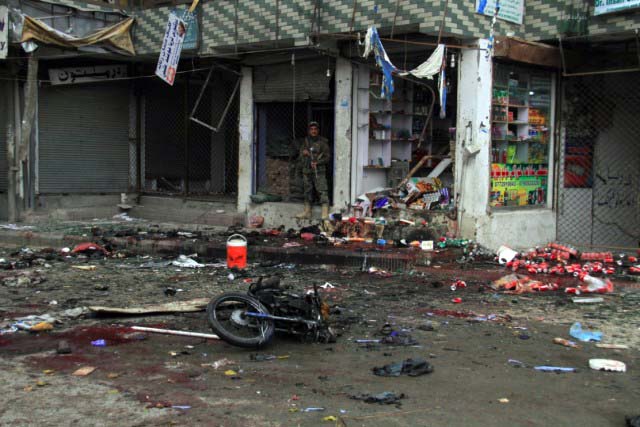The globally systemic crimes have prompted the world to tackle the issue in one way or another. As a result, the 1909 Shanghai Opium Commission was a multinational drug-control initiative. The participants passed resolutions urging national governments to enact measures to curb opium smoking in their countries and ban the export of opium to countries that prohibited importation. Moreover, the United Nations Convention was held against Illicit Traffic in Narcotic Drugs and Psychotropic Substances in Vienna on December 20, 1988. These commissions were intergovernmental reaction against crimes.
Besides many international challenges, terrorism is a great crisis which blackmails the world. The ideological stereotypes and scholastic fundamentalism enhance the number of insurgent groups. For instance, the self-style Islamic State of Iraq and the Levant (ISIL) is the product of extreme beliefs. Similarly, the Taliban’s regime from 1996 – 2001 ruled Afghanistan under the aegis of holy banner. The ideologue insurgents, which have been and are vehicles for political masterminds, were incubated in madrasahs to be used as means of pressurizing states.
Currently, the ISIL’s vague policy has generated a great turmoil around the globe. Alleging to establish “Islamic Caliphate” on the surface of earth via “Jihad”, the ISIL has violated the territorial integrity of many countries and global security is left at the mercy of terrorism and militancy. In other words, the recent terrorist attacks in Paris, as ISIL claimed the responsibility, and Mali – which led to the death and injuries of more than 300 people – reflect that civilians are highly vulnerable to terrorism without being involved in politics. The indiscriminate killing of non-combatants carried out by militant outfits is a matter of great concern for the world and has to be tackled promptly.
The International Criminal Court (ICC), which began functioning on July 01, 2002, is the court of last resort for prosecution of genocide, war crimes, and crimes against humanity. Crimes against humanity are defined as acts “committed as part of a widespread or systematic attack directed against any civilian population, with knowledge of the attack”.
Moreover, war crimes include willful killings, torture, inhumane treatment, willfully causing great suffering, denying a fair trial, unlawful deportation and transfer, unlawful confinement, taking hostages ….
Since terrorists commit all the mentioned felonies, they are widely involved in war crimes and have to be prosecuted by ICC. The international community should have pursued and prosecuted the insurgents and terrorist networks, mainly the founders, supporters and leaders, long ago. Undeniably, the countries plagued by insurgency and rebel such as Syria, Iraq, Afghanistan are unable to bring the militants to justice and the ICC must take step in this regard. Al-Qaeda, Taliban and like minded groupds perpetrated outrageous crimes in Afghanistan. Despite being involved in genocide, war crimes and crimes against humanity, Osama, the founder and head of the Islamist militant group al-Qaeda, was killed without trial in Abbottabad of Pakistan on May 02, 2011 by United States Navy SEALs of the U.S. Naval Special Warfare Development Group. Although, legal and ethical aspects of the killing, such as his not being taken alive despite being unarmed, were questioned by Amnesty International, nonetheless, it remained unanswered. Similarly, Mullah Omar passed away in Pakistan two years ago without being brought to justice.
Afghanistan was the victim of tremendous war crimes and crimes against humanity throughout the history. The rights and dignity of large number of people, including women and children, were violated not only during the Taliban’s regime but also when the former Soviet Union occupied Afghanistan and infringed the territorial integrity. Within these historical wars, a great number of people, including women and children, were massacred and buried in mass graves and many more were amputated by land mines even in post-war period. Were the perpetrators brought to justice?
The Taliban’s ragtag militants, who were reorganized across the border after the collapse of their regime, are still involved in acts of terror in Afghanistan. They target the combatants and non-combatants alike without paying heed to national and international law. They pressurize the democratic state through terrorizing and shedding the blood of citizens. The civilian death toll has increased on a large scale in recent months and people flock to foreign countries to breathe a sigh of relief in a secure atmosphere. In a nutshell, the criminals are at loose without being pursued by regional or international criminal courts.
The world’s criminal justice system should “reduce crime by bringing more offences to justice, and to raise public confidence that the system is fair and will deliver for the law-abiding citizen”.
After all, the ISIL, operating under Abu Bakr al-Baghdadi, has gained a firm foothold in the country and worsened the security situation. The militants stoke sectarianism through hostage-taking and murdering ethnic groups and rebel against the state in one way or another. However, the international community, mainly ICC, give no signal to these worldwide criminals.
Criminal justice plays a huge role throughout society as a whole in any place. Afghan government should adopt strict criminal justice regarding the militants. Those who are involved in terrorism, drug trafficking, etc. must be brought to justice by the state courts. In case of not being trialed in the country, the international courts should prosecute them for committing intergovernmental crimes.

